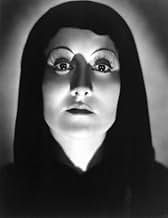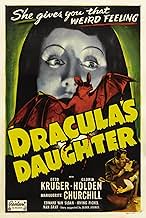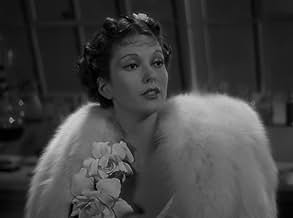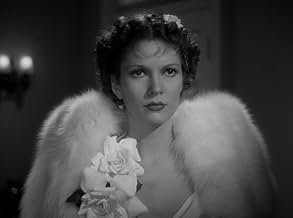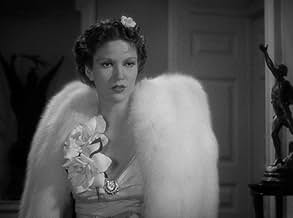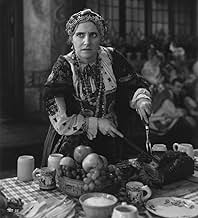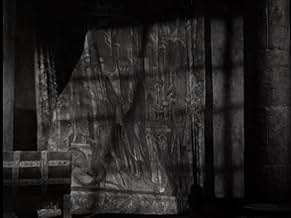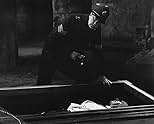CALIFICACIÓN DE IMDb
6.3/10
8.7 k
TU CALIFICACIÓN
Cuando la condesa Marya Zaleska aparece en Londres, ocurren misteriosos acontecimientos que llevan al Dr. Von Helsing a creer que la condesa debe ser un vampiro.Cuando la condesa Marya Zaleska aparece en Londres, ocurren misteriosos acontecimientos que llevan al Dr. Von Helsing a creer que la condesa debe ser un vampiro.Cuando la condesa Marya Zaleska aparece en Londres, ocurren misteriosos acontecimientos que llevan al Dr. Von Helsing a creer que la condesa debe ser un vampiro.
- Dirección
- Guionistas
- Elenco
- Premios
- 1 premio ganado y 1 nominación en total
Halliwell Hobbes
- Hawkins
- (as Halliwell Hobbs)
Claud Allister
- Sir Aubrey
- (as Claude Allister)
Agnes Anderson
- Elena
- (sin créditos)
John Blood
- Bobby
- (sin créditos)
David Dunbar
- Motor Bobby
- (sin créditos)
Douglas Gordon
- Attendant
- (sin créditos)
Owen Gorin
- Groom's Friend
- (sin créditos)
Opiniones destacadas
"Dracula's Daughter" is a trailblazer in many respects. It's the earliest film I can think of that features a truly sympathetic vampire protagonist. It's also the earliest mainstream film that I'm aware of with such a strong lesbian subtext. (Actually, it's not even a "sub" text, it's plain as day!) As you might expect, these rather surprising elements make it a highly memorable viewing experience - perhaps even more memorable than its predecessor, Lugosi's "Dracula," which is basically just a truncated version of Bram Stoker's novel.
Unfortunately, "Dracula's Daughter" misses the mark of greatness that it probably deserves. The film is only about an hour and ten minutes long, so there isn't sufficient time to fully develop Countess Zaleska, the title character. And it's extremely frustrating that the first fifteen minutes or so are basically squandered on a lot of painfully unfunny business involving two comedy constables. The humor has aged really, really badly, unless you somehow find it convulsively hilarious when one of the constables reacts to every strange and dramatic happening around him by saying "oooh..."
I tend to complain that modern-day horror features too much dumb comedy that hurts its credibility, but "Dracula's Daughter" is living proof that studios were injecting silly rubbish into otherwise good horror material as long as seventy years ago!
The serious parts of the film work well, however. Countess Zaleska and her faithful servant, Sandor, have some interesting exchanges about the loneliness of immortality and the darkness of the vampire's universe. The scene when Zaleska burns her father's body is also very moody and dramatic. (How does one get a job like Sandor's, anyway? Don't you think it would be fun to play personal servant to a glamorous female vampire? No? Maybe it's just me, then.)
If the film has another flaw, aside from the comedy, it's the human protagonist, Dr. Garth. Otto Kruger plays the character as stubborn and really rather abrupt. He'll spew a few lines of psycho-babble at the countess, then charge out of the room and leave his job with her half-done at best. A more attentive psychiatrist might perhaps have made for a more sympathetic and proactive hero. As it is, he's basically just an irritating presence who distracts us from the "villains," who are infinitely more interesting and more worthy of our time.
Unfortunately, "Dracula's Daughter" misses the mark of greatness that it probably deserves. The film is only about an hour and ten minutes long, so there isn't sufficient time to fully develop Countess Zaleska, the title character. And it's extremely frustrating that the first fifteen minutes or so are basically squandered on a lot of painfully unfunny business involving two comedy constables. The humor has aged really, really badly, unless you somehow find it convulsively hilarious when one of the constables reacts to every strange and dramatic happening around him by saying "oooh..."
I tend to complain that modern-day horror features too much dumb comedy that hurts its credibility, but "Dracula's Daughter" is living proof that studios were injecting silly rubbish into otherwise good horror material as long as seventy years ago!
The serious parts of the film work well, however. Countess Zaleska and her faithful servant, Sandor, have some interesting exchanges about the loneliness of immortality and the darkness of the vampire's universe. The scene when Zaleska burns her father's body is also very moody and dramatic. (How does one get a job like Sandor's, anyway? Don't you think it would be fun to play personal servant to a glamorous female vampire? No? Maybe it's just me, then.)
If the film has another flaw, aside from the comedy, it's the human protagonist, Dr. Garth. Otto Kruger plays the character as stubborn and really rather abrupt. He'll spew a few lines of psycho-babble at the countess, then charge out of the room and leave his job with her half-done at best. A more attentive psychiatrist might perhaps have made for a more sympathetic and proactive hero. As it is, he's basically just an irritating presence who distracts us from the "villains," who are infinitely more interesting and more worthy of our time.
In London, two policemen find the body of a man, Renfield, with neck broken and Dracula with a stake through his heart. They arrest Prof. Von Helsing (Edward Van Sloan) that tells that he did it and take him to the Scotland Yard. The inspector Sir Basil Humphrey (Gilbert Emery) asks Von Helsing who might defend him and the professor asks for the psychiatrist Dr. Jeffrey Garth (Otto Kruger). Meanwhile, the mysterious Countess Marya Zeleska (Gloria Holden), who is Dracula's daughter, compels the policeman that is in charge to take care of the bodies and takes Dracula's body with her to bury him with her assistant Sandor (Irving Pichel) before dawn, expecting to be released from the family's curse.
In Edinburgh, Jeffrey is hunting with friends and his assistant Janet Blake (Marguerite Churchill) comes to tell him that he has an appointment with the Scotland Yard to help his friend Von Helsing. When Von Helsing tells him about Dracula, Jeffrey believes that he is obsessed with the vampire and promises to help him. During the night, he goes to a party where he meets the Hungarian Countess and he tells his theories about the vampire blood thirsty that he believes is an obsession. Now, Countess Zeleska believes that Jeffrey can heal her and release her from her blood thirsty and she wants to bring him to her castle to spend the eternal life with her in Transylvania.
"Dracula's Daughter" is a great vampire movie, with the dramatic story of a vampire woman that wishes to be free from the curse of her father, Dracula. The plot is naive and funny, and the relationship between the annoying Jeffrey and the witty Janet is amusing. This is one of the best movies of Universal Studios in this genre. My vote is seven.
Title (Brazil): "A Filha de Drácula" ("The Dracula's Daughter")
In Edinburgh, Jeffrey is hunting with friends and his assistant Janet Blake (Marguerite Churchill) comes to tell him that he has an appointment with the Scotland Yard to help his friend Von Helsing. When Von Helsing tells him about Dracula, Jeffrey believes that he is obsessed with the vampire and promises to help him. During the night, he goes to a party where he meets the Hungarian Countess and he tells his theories about the vampire blood thirsty that he believes is an obsession. Now, Countess Zeleska believes that Jeffrey can heal her and release her from her blood thirsty and she wants to bring him to her castle to spend the eternal life with her in Transylvania.
"Dracula's Daughter" is a great vampire movie, with the dramatic story of a vampire woman that wishes to be free from the curse of her father, Dracula. The plot is naive and funny, and the relationship between the annoying Jeffrey and the witty Janet is amusing. This is one of the best movies of Universal Studios in this genre. My vote is seven.
Title (Brazil): "A Filha de Drácula" ("The Dracula's Daughter")
The best of the Universal Dracula films will always be the one from 1931 with Bela Lugosi, which is one of the best and most iconic Universal Studios horrors. But its follow-ups generally are worth a look; Son of Dracula despite Lon Chaney Jnr's miscast Dracula was much better than expected, being a good-looking film with a lot of atmosphere and at least two scenes among the best of any Universal Studios Gothic horror film but House of Dracula while watchable was disappointing apart from a couple of effective sequences, nice sets and a few good performances but did suffer mainly from having too many ideas and not enough time to explore them.
Dracula's Daughter however is the best of them. Is it as good as the 1931 film? No, but it almost is. Two or three things do bring it down. The humour at the beginning with the cops was incredibly hokey and more overly-silly and misplaced than funny. Otto Kruger is an unappealingly stiff male lead, Garth has some very abrupt decision-making that Kruger overdoes to the point it gets annoying. And while the banter between him and Marguerite Churchill's Janet was very enjoyable and witty there was a little too much of it, it could have taken up less of the film and the film could have focused more on Von Helsing. Personal opinion of course.
On the other hand, Dracula's Daughter has great production values. The costumes and sets are sumptuous and splendidly Gothic and the film's beautifully photographed too. The music score, actually sounding original and not stock, compliments the mood very well and has to be one of the eeriest of any of the music scores in the Universal horrors. Dracula's Daughter is wittily scripted as just as I appreciated the film noir-ish-like direction of Son of Dracula I also appreciated the sombre, moody approach that the direction in Dracula's daughter took. The story, apart from the hokey start, is fun and atmospheric, there is a real eeriness but a poignant edge too. Of individual scenes the scene with the Countess Zaleska and Lilli is infamous and for a reason. Apart from Kruger the acting is good, Marguerite Churchill is amusing and Edward Van Sloan once again brings class to Von Helsing but the most memorable turns are from Irving Pichel and especially Gloria Holden. Pichel is effectively sinister especially towards the end while Holden is unforgettable in the title, subtly creepy but somewhat tragic.
All in all, not as good as the 1931 film but of the Dracula sequels Universal made to me Dracula's Daughter's the best one. 8/10 Bethany Cox
Dracula's Daughter however is the best of them. Is it as good as the 1931 film? No, but it almost is. Two or three things do bring it down. The humour at the beginning with the cops was incredibly hokey and more overly-silly and misplaced than funny. Otto Kruger is an unappealingly stiff male lead, Garth has some very abrupt decision-making that Kruger overdoes to the point it gets annoying. And while the banter between him and Marguerite Churchill's Janet was very enjoyable and witty there was a little too much of it, it could have taken up less of the film and the film could have focused more on Von Helsing. Personal opinion of course.
On the other hand, Dracula's Daughter has great production values. The costumes and sets are sumptuous and splendidly Gothic and the film's beautifully photographed too. The music score, actually sounding original and not stock, compliments the mood very well and has to be one of the eeriest of any of the music scores in the Universal horrors. Dracula's Daughter is wittily scripted as just as I appreciated the film noir-ish-like direction of Son of Dracula I also appreciated the sombre, moody approach that the direction in Dracula's daughter took. The story, apart from the hokey start, is fun and atmospheric, there is a real eeriness but a poignant edge too. Of individual scenes the scene with the Countess Zaleska and Lilli is infamous and for a reason. Apart from Kruger the acting is good, Marguerite Churchill is amusing and Edward Van Sloan once again brings class to Von Helsing but the most memorable turns are from Irving Pichel and especially Gloria Holden. Pichel is effectively sinister especially towards the end while Holden is unforgettable in the title, subtly creepy but somewhat tragic.
All in all, not as good as the 1931 film but of the Dracula sequels Universal made to me Dracula's Daughter's the best one. 8/10 Bethany Cox
One of Universal's most unusual horror films and a more than worthy successor to Lugosi's Dracula (1931) - although I wouldn't go so far as to say it's better: BRIDE OF FRANKENSTEIN (1935) it ain't! The film's approach is very different to its predecessor - despite having the same scriptwriter, Garrett Fort - as it presents the vampire lady of the title as a somewhat tragic figure rather than a mere spook, and Gloria Holden has both the exotic looks and acting talent for the role. Perhaps to make up for Lugosi's absence, the script features a creepy vampire acolyte in the figure of Irving Pichel: fine actor though he is, I think the make-up department went overboard in trying to make him look menacing!
Otto Kruger and Marguerite Churchill are two of the oddest, and yet most likable, leads in a Universal horror film: not only their age difference is immediately apparent, as is their obvious intelligence, but they share a love/hate relationship all through the picture which is both fresh and endearing. The supporting cast is filled with stalwarts of the genre: first and foremost, naturally, is Edward Van Sloan who reprises his seminal Van Helsing characterization as if he had never been away; Billy Bevan, Halliwell Hobbes and E.E. Clive as coppers of different ranks; Gilbert Emery as the unavoidable incredulous Scotland Yard official; Edgar Norton as his 'fresh' butler; and, adding to the fun, there's also Claud Allister as an upper-class nitwit and famed columnist Hedda Hopper as a gossiping socialite. Nan Grey, later female lead of THE INVISIBLE MAN RETURNS (1940), appears briefly as one of Dracula's victims in what remains perhaps the film's most discussed scene (due to its lesbian overtones). Unlike the original, this sequel is briskly paced and the vampire's demise is not anti-climactic.
Otto Kruger and Marguerite Churchill are two of the oddest, and yet most likable, leads in a Universal horror film: not only their age difference is immediately apparent, as is their obvious intelligence, but they share a love/hate relationship all through the picture which is both fresh and endearing. The supporting cast is filled with stalwarts of the genre: first and foremost, naturally, is Edward Van Sloan who reprises his seminal Van Helsing characterization as if he had never been away; Billy Bevan, Halliwell Hobbes and E.E. Clive as coppers of different ranks; Gilbert Emery as the unavoidable incredulous Scotland Yard official; Edgar Norton as his 'fresh' butler; and, adding to the fun, there's also Claud Allister as an upper-class nitwit and famed columnist Hedda Hopper as a gossiping socialite. Nan Grey, later female lead of THE INVISIBLE MAN RETURNS (1940), appears briefly as one of Dracula's victims in what remains perhaps the film's most discussed scene (due to its lesbian overtones). Unlike the original, this sequel is briskly paced and the vampire's demise is not anti-climactic.
As the last movie completed before the Laemmles were ousted from control of Universal, DRACULA'S DAUGHTER holds some interest as a place marker, surely; now, the men who had fought the patent trust and had largely given way to the next generation. Yes, Zukor was hanging in as Chairman at Paramount, but with vastly curtailed power; DeMille was beginning his own renaissance -- by becoming a parody of himself -- and Lasky was still fading, although he would continue to produce increasingly ponderous prestige films over the next dozen years. Only Goldwyn would prosper -- but no one liked him.
But this is Dracula's Daughter I'm talking about, and it's just fine. I like Lambert Hillyer's frequently matter-of-fact handling of the movie, with its complicated lesbian and Triple-Goddess subtext. I can't see all the money on the screen (over a quarter of a million dollars -- a huge sum for Universal), but I am amused by the opening, with its "All right, Doctor, you've killed Count Dracula. You're claiming an insanity defense, are you?" attitude.
But this is Dracula's Daughter I'm talking about, and it's just fine. I like Lambert Hillyer's frequently matter-of-fact handling of the movie, with its complicated lesbian and Triple-Goddess subtext. I can't see all the money on the screen (over a quarter of a million dollars -- a huge sum for Universal), but I am amused by the opening, with its "All right, Doctor, you've killed Count Dracula. You're claiming an insanity defense, are you?" attitude.
¿Sabías que…?
- TriviaOriginally, Universal wanted to make a sequel based on Bram Stoker's short story 'Dracula's Guest' and negotiated with Stoker's widow Florence. During the talks between the two, it was discovered that Bram Stoker had not complied with one requirement of the U.S Copyright office with his novel 'Dracula', which rendered it public domain in the United States. Because Florence wanted more creative control over the sequel, and Bela Lugosi wanted more money to reprise the role of Count Dracula, Universal instead hired John L. Balderston to write a new story.
- ErroresAlthough the film takes place mostly in London, telephones consistently ring one ring at a time, whereas British phones have always used a double ring.
- Citas
Lady Esme Hammond: Sherry, Marya?
Countess Marya Zaleska: Thank you, I never drink... wine.
- ConexionesFeatured in Shock Theater: Dracula's Daughter (1959)
Selecciones populares
Inicia sesión para calificar y agrega a la lista de videos para obtener recomendaciones personalizadas
Detalles
- Fecha de lanzamiento
- País de origen
- Sitios oficiales
- Idiomas
- También se conoce como
- Dracula's Daughter
- Locaciones de filmación
- Productora
- Ver más créditos de la compañía en IMDbPro
- Tiempo de ejecución1 hora 11 minutos
- Color
- Relación de aspecto
- 1.37 : 1
Contribuir a esta página
Sugiere una edición o agrega el contenido que falta

Principales brechas de datos
What is the Spanish language plot outline for La hija de Drácula (1936)?
Responda

